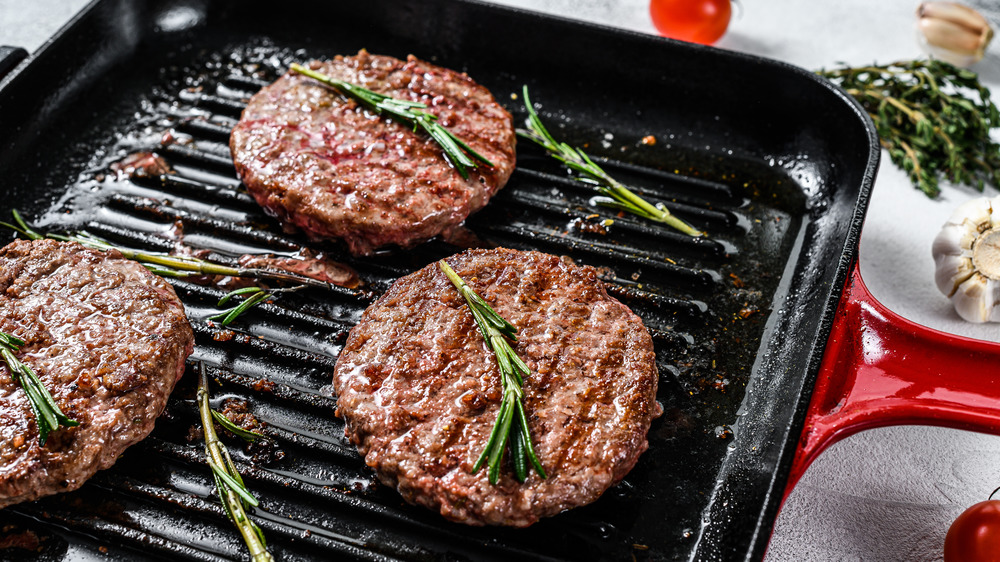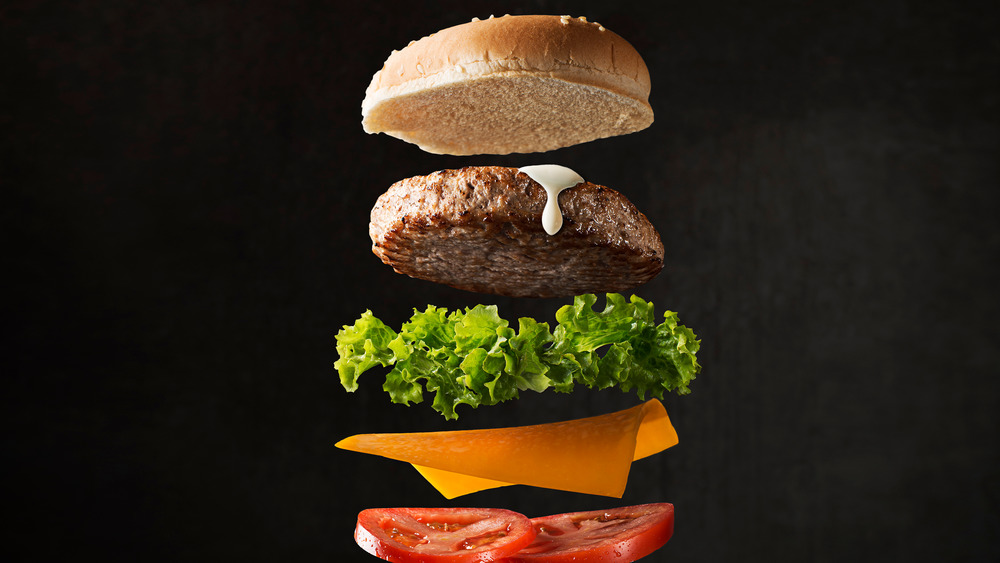Don't Eat Another Hamburger Before Reading This
When a craving strikes, nothing hits the spot like a hamburger. These treats have become synonymous with backyard barbecues, celebrations at restaurants, and just general fun! While hamburgers can tempt our taste buds, they can wreak some serious havoc on our health if we overindulge. According to the Chicago Tribune, you face an increased risk of obesity, diabetes, and coronary heart disease if you overdo it on fast food like hamburgers, making them a serious gamble if you need to eat healthy. On the other hand, eating plans that follow the 80/20 rule — where you focus on eating healthy foods 80 percent of the time and can loosen up the other 20 percent — allow for the occasional hamburger. In fact, these rules encourage it in order to deliver certain beneficial nutrients (via NBC).
Registered dietician, master of science, and certified dietician/nutritionist Amy Shapiro spoke with Mashed to set the record straight when it comes to how hamburgers affect your health. Where you buy your burger, meat additives, and even toppings all play into how your burger can influence your health, and each aspect should get examined thoroughly if you need to keep your diet on the straight and narrow.
Positive health benefits start at the source
When you start to figure out how to optimize your burger for the best health benefits, Shapiro recommends that you begin by examining the meat that goes into making your sandwich. "You want your meat filler-free, so the only ingredient should be 100 percent beef, unless it [has] already been seasoned and you can [see] the spices like salt, pepper, [or] garlic," Shapiro said. "I recommend buying grass-fed/grass-finished to allow for more omega-3 fatty acids and less saturated fat. Also, if possible, look for organic meats or at the very least meat that has not been treated with [antibiotics]."
When you have to decide on which meat to use if you want to whip up a burger, don't forget to check the saturated fat content of the beef. "Red meat can be high in saturated fat and that is the fat that clogs arteries," Shapiro continued. "So limit it or look for lean cuts. I recommend 90 percent lean if possible. Also, grass-fed meat contains more omega-3 heart protective fats and less saturated fat, so it helps to look for that too."
The perfect toppings for the perfect burger
Don't assume your health worries ended at your patty selection — your toppings can make all the difference. "If you add veggies, such as lettuce, tomato, onion, pickles, jalapeno, [or] avocado, these will help to add nutrients, vitamins, minerals, [and] fiber," Shapiro said. "Additionally, if you use a whole wheat bun then you add fiber and whole grains rounding out the meal."
"If you choose thick sauces, lots of ketchup, cheese, or fried toppings, you quickly increase the overall calories, saturated fat and sodium," Shapiro continued. "A white bun also adds simple carbohydrates which quickly break down into sugar in the body, and is void of any nutritional value."
It might seem impossible, but you can easily make a healthy burger without sacrificing flavor. "I recommend 100% grass-fed/grass-finished meat that contains shredded veggies like mushrooms, carrots, etc to add fiber and nutrients, [and] load it up with any raw veggies offered," Shapiro said. "Enjoy it on a sprouted whole wheat bun, just as a patty, on top of a large salad, or in a lettuce wrap."
"If you are eating a regular burger, I recommend taking the top off and pairing with a side salad instead of fries," Shapiro continued. If you can, Shapiro recommends buying organic brands or meat from your local farmers market, which is fresh and well-sourced. "I recommend eating red meat at most two times per week for optimal health," Shapiro said. "It is a great source of iron, vitamins, and zinc and can be part of a balanced diet."


